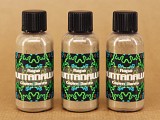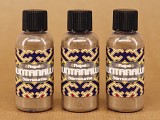Pot, 60 Ml, 40 Gr from Brazil (SKU 5524)
(Batch #5490). This medium-dark grey-brown Rapé, crafted by the Kuntanawa tribe, blends Sabia Corda Tabaco, Tsunu ashes, and the aromatic herb Apuxuri (also known as Pixuri). Grounding and cleansing, it clears the mind while gently uplifting the spirit. Sabia anchors the energy, Tsunu opens spiritual pathways, and Apuxuri adds a fragrant, heart-opening quality that promotes clarity and gratitude. The blend enters with a sharp, warming presence and settles into smooth stillness. A powerful tool for focused intention, breathwork, and connection, this Rapé reflects the collaborative wisdom and ceremonial depth of the Kuntanawa people. More information can be found below.
Packed in 60 ml clear plastic pots containing 40 gr.
| change currency | |||||||||
| SKU | Part | Volume | Weight | Unit | Price | Qty
|
|||
|---|---|---|---|---|---|---|---|---|---|
| 4147 | bottle | 10 ml | 7 gr | 1 pc | $ 22.67 | ||||
| 4116 | bottle | 25 ml | 15 gr | 1 pc | $ 45.34 | ||||
| 5524 | pot | 60 ml | 40 gr | 1 pc | $ 108.32 | ||||
Kuntanawa Corda Tsunu - Grounding clarity with Sabia, Tsunu, and the spirit-lifting warmth of Apuxuri
Function and Composition
Kuntanawa Corda Tsunu is a potent ceremonial Rapé blend handcrafted by the Kuntanawa family using Sabia Corda Tabaco, Tsunu ashes (Platycyamus regnellii), and the aromatic forest herb Apuxuri, also referred to as Pixuri in other tribal traditions. This medium-dark grey - light brown blend is known for its grounding and clearing effects, balanced by a bright, almost euphoric aftertone. Its energetic structure is both anchored and elevated—offering a refined balance between strength, warmth, and spiritual expansion.
Each ingredient plays a distinct role: Sabia for depth and gravity, Tsunu for cleansing and alignment, and Apuxuri for breath, clarity, and heartful expansion. Together, they form a powerful tool for focused intention, inner stillness, and uplifted perception.
Energetic and Ceremonial Effects
This Rapé enters with a sharp, warming presence that quickly centers attention and deepens the breath. The initial sensation can be intense—often accompanied by eye-watering and a deep clearing of the sinuses—but settles into a smooth and refined experience. The ultrafine consistency allows for clean absorption and minimal throat irritation, allowing the user to sit deeply with the aftereffects.
While Sabia Tabaco firmly grounds the body, Tsunu opens channels of spiritual perception, and Apuxuri lifts the senses with a warm and clarifying resonance. The experience is often described as “soaring like an eagle while remaining rooted to the earth”—a balance of downward anchoring and upward insight.
This blend is particularly suited for clearing mental clutter, releasing emotional heaviness, and entering prayer or meditation with focused intention and breath awareness.
Sabia Corda Tabaco
Sabia Corda is a dark, nearly black variety of Nicotiana rustica prepared through traditional rope-curing methods. Known for its rich aroma, deep strength, and neutral flavor, Sabia is often chosen for grounding and strong ceremonial blends. It is less associated with the heart space than other Tabacos like Mói, and instead acts more directly on the base chakra and physical awareness.
In the context of this Rapé, Sabia brings firmness, clarity, and deep stillness to the blend—especially when used in larger doses, where it can evoke profound, even transcendental, awareness. To read a detailed article on the Sabia Tabaco, click here.
Tsunu Ashes – Platycyamus regnellii
Tsunu is one of the most respected trees used for ashes in Rapé. The strong wood of this Amazonian legume yields a fine, light ash with exceptional energetic properties. Tsunu is widely used across tribal traditions for cleansing, opening the spiritual path, and enhancing the clarity of Tabaco-based blends. Tsunu ashes assist in clearing blockages—mental, emotional, or energetic—and help restore a free and flowing state of awareness. Their effect is both gentle and firm, supporting deep inner work, prayer, and meditation. To read a comprehensive article on Tsunu ashes, click here.
Apuxuri – The Spirit of Pixuri
Apuxuri, known in some traditions as Pixuri (Licaria puchury-major), is a sacred aromatic herb revered by several Amazonian tribes, including the Kuntanawa and Puyanawa. While regional names and uses vary, these tribes often describe Apuxuri and Pixuri as closely related or identical plants, both used to uplift the spirit, clear heavy energies, and restore clarity to mind and heart.
Apuxuri contains a rich array of aromatic compounds including safrole, eucalyptol, alpha-terpineol, and eugenol, which contribute to its warm, resinous scent and bright energetic profile. In Rapé, it offers a fragrant counterpoint to the denser tones of Tabaco and ashes, adding subtle warmth, presence, and flow to the experience.
Beyond its use in Rapé, Apuxuri is employed in herbal baths, smoke rituals, and even cooking (its seeds are known as “Brazilian Nutmeg”). It is said to influence all the chakras—awakening emotional balance, mental focus, and a feeling of gratitude and energetic lightness.
In this blend, Apuxuri provides a luminous quality that supports deep presence and spiritual elevation. To read a detailed article on Apuxuri (Pixuri), click here.
Tribal and Cultural Context
This Rapé was created through a collaborative process within the Kuntanawa tribe, whose territory lies along the Tejo River in Acre, Brazil. With a population of around 400 individuals, the Kuntanawa are known for their deep spiritual connection to forest medicine, particularly Rapé, Ayahuasca, and sacred plants used in purification and prayer.
The preparation of Corda Tsunu reflects this communal spirit—where multiple members of the community participate in harvesting bark, preparing ashes, cultivating Tabaco, and infusing the blend with collective intention. The Rapé is more than a product—it is the result of ancestral knowledge, forest partnership, and shared spiritual labor. To read a detailed article on the Kuntanawa tribe, click here.
Natural Variation and Care Notes
As with all authentic tribal Rapé, each batch may vary slightly in appearance, aroma, and intensity based on season, weather, and source material. These variations are signs of its natural origin and living connection to the forest.
Store tightly sealed in a cool, dry place away from light and moisture. This Rapé is ultrafinely sieved and stable in texture, ideal for precise dosing and ritual use.
Breath Practice
To deepen the effects of this Rapé, accompany it with slow, intentional breathwork. After application, remain seated with a relaxed posture and let the shoulders drop naturally. Inhale deeply through the mouth, filling the lungs without force. Pause for a brief moment, then exhale by softening the belly and allowing the breath to release fully, as if guided by gravity. Let the breath flow in waves—steady, grounded, and unforced—helping to circulate the medicine’s energy and anchor its presence throughout the body.
On the Use of Intentions
As with all sacred medicines, the spirit of this Rapé responds to inner alignment. Approach with reverence and clear purpose—whether for grounding, prayer, clearing, or connection. Let the breath carry your intention, and let the medicine guide it through the body. For guidance with intentions and affirmations, click here.
Setting the Standard for Ultra Fine Rapé
We take great care to reprocess all received stock to ensure the finest quality powder. Often, Rapé arrives with varying levels of fineness due to the lack of professional sieves used by the tribe. To address this, we meticulously sieve all powders to remove rough bits and particles, resulting in an exceptionally smooth and effective powder at 150-micron fineness. We use laboratory-grade sieves and dehydrating equipment to achieve this quality. This is our standard because it provides the best Rapé experience.
Disclaimer
The information provided above is for historical, educational, and scientific purposes only. It should not be interpreted as a recommendation for the specific use of our products. Any statements about traditional uses are informational. The use and application of our products are the customer's decision and responsibility.
Copyright Notice
All content, including this article, is protected under copyright law. Any unauthorized reproduction, distribution, or use of this material is prohibited. Duplication of this content, in whole or in part, without written consent, is a violation of copyright regulations.
Other names: Sabia Corda Tsunu, Kuntanawa Apuxuri.
This item is not allowed in the following countries:
Finland
This natural product is offered for its ethnographic and historical value and is delivered with no expressed or implied fitness for a specific purpose. It is simply a raw botanical specimen, or a scientific sample. The information provided is purely meant for historical, scientific and educational purposes and should never be interpreted as a recommendation for a specific use. The use and application of our product is at the customer's decision, responsibility and risk.
Read our Terms & Conditions for more details.











